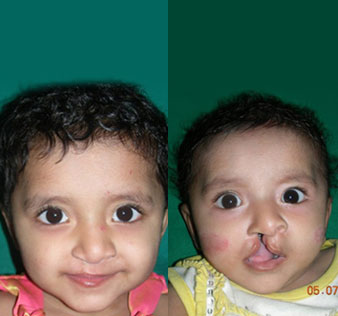
Cleft Lip
Cleft palate and cleft lip are among the most common birth defects in which there is a split or cleft in the lip or palate or sometimes both. They occur when facial constructions that are evolving in the unborn foetus do not completely close. Although it is disheartening to have a baby born with this condition, the cleft palate and lip cleft can be corrected. In most babies, a series of surgeries can enable normal function and achieve the most normal appearance with minimal scarring.
Causes
The lips of a baby form between the 4th and 7th weeks of pregnancy. While a baby grows during pregnancy, the special cells and body tissues from either side of the head grow toward the centre and join to form the face. This linking of tissue results in the formation of the mouth and lips. In cases where the tissue which forms the lip doesn’t connect fully before birth, a cleft is caused. This leads to the upper lip opening up. The opening in the lip can be as small as a slit, or it can be a big opening that goes through the lip into the nose.
The roof of the mouth (palate) is developed during the sixth and ninth weeks of pregnancy. A cleft palate is formed if the roof of the baby’s mouth does not connect entirely during pregnancy. In some cases, both the back and front parts of the palate of the baby are open. For others, only the front part of the palate is open.
Although in most cases a definite cause is unknown, researchers believe that most cases of cleft palate and cleft lip are caused by an interaction of genetic and environmental factors.
Any of the two parents can transfer genes that lead to the clefting, either unaccompanied or as a portion of a genetic disorder that comprises of a cleft palate or cleft lip is one of its symbols. In certain cases, the baby may inherit a gene from the parents that make them more prospective to have a cleft, which, followed by a trigger from the environment, maybe the basis for the cleft to form.
There is some evidence that women who are more likely to smoke and drink alcohol during pregnancy are at a higher risk.
Women with diagnosed diabetes before pregnancy are known to be at a bigger hazard of having a child with a cleft lip without or with a cleft palate, in comparison to women who did not have diabetes.
Problems associated with Cleft Lip or Cleft Palate
Born with this deformity, children are seen to encounter some problems as part of their normal lifestyle.
Treatment
Dr Satya Saraswat has been accredited by Smile Train (world’s chief cleft charity organization) to provide treatment free of cost of cleft palate and lip and it’s secondary malformations. Our team of experts has successfully performed around 6000 such operations in the last thirteen years.
Most children lead a healthy and perfectly normal life after a Cleft surgery.
Post care